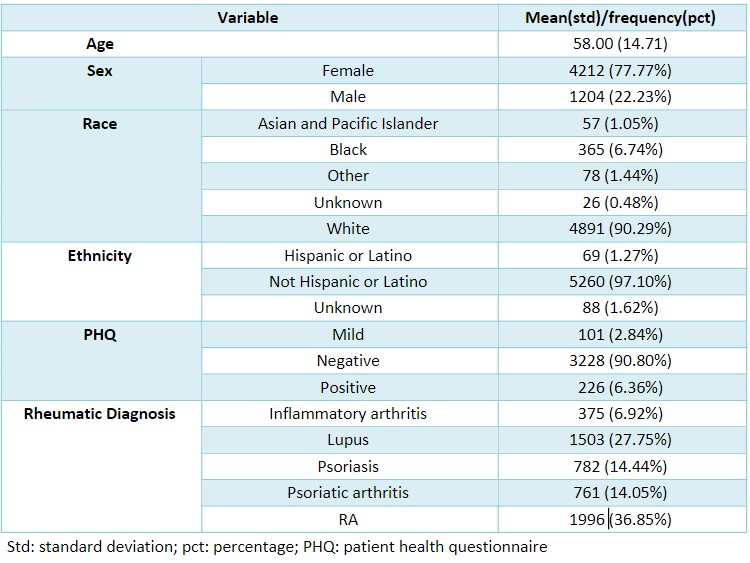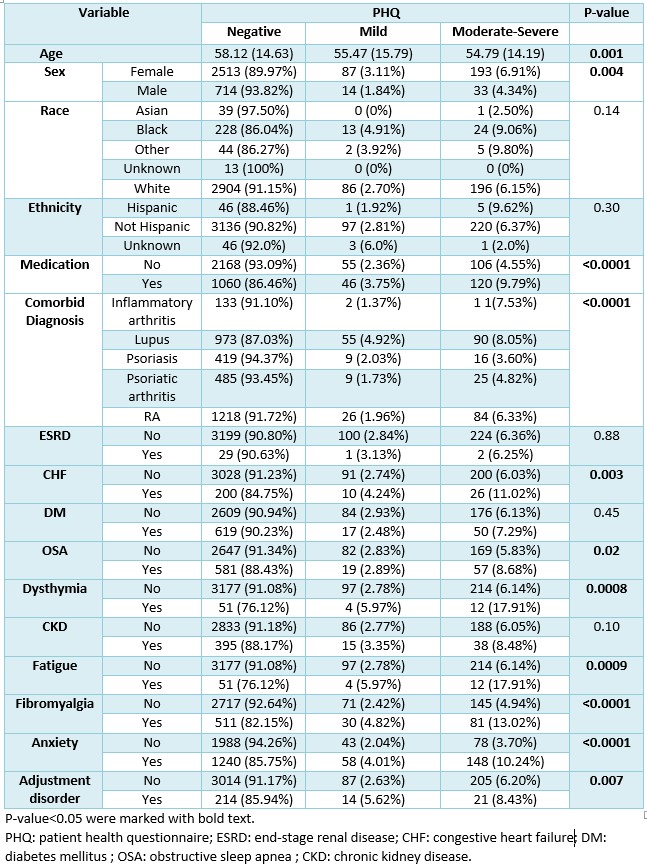Session Information
Session Type: Poster Session B
Session Time: 10:30AM-12:30PM
Background/Purpose: Depression is common and known to be associated with poorer outcomes among patients with rheumatologic diseases, likely stemming from the chronic and sometimes debilitating nature of these conditions (1). Hence, awareness and screening for depression in this population is critical. The Patient Health Questionnaire (PHQ-9) is a well validated screening tool for depression (2). In this study, we analyzed the rates of positive PHQ-9 screening and associated demographics and comorbidities in patients with certain rheumatic diseases seen in Allegheny Health Network (AHN) rheumatology clinics.
Methods: This is a cross-sectional study conducted in patients with a diagnosis of rheumatoid arthritis (RA), systemic lupus erythematosus (SLE), psoriasis, psoriatic arthritis, and inflammatory arthritis. PHQ-9 assessment was utilized to screen for depression in these patients during a rheumatology clinic visit. PHQ scores ≤9 were considered “mild” depression, and scores ≥10 were considered “moderate-severe”. Demographic data, use of antidepressants, and certain comorbidities were also assessed in this patient population and compared with PHQ-9 using ANOVA, chi-square test or Fisher’s exact test, as appropriate. Alpha level 0.05 and SAS 9.4 were used for all statistical analysis.
Results: From the 5,416 patients included in this study, 3,555 (65.6%) had a PHQ-9 available. Table 1 represents the patient demographics. As demonstrated in Table 2, positive moderate-severe depression screening rates were as follows: SLE 8.05%, inflammatory arthritis 7.53%, RA 6.33%, psoriatic arthritis 4.82%, and psoriasis 3.60%. Patients with positive depression screening were more commonly female (6.91% vs 4.34% male, p-value 0.004) and relatively younger (54.8 years old vs 58.1 with negative PHQ-9 screening, p-value 0.001). Patients with anxiety, adjustment disorder, dysthymia as well as congestive heart failure (CHF), obstructive sleep apnea (OSA), fatigue, and fibromyalgia (p-values < 0.05) were more likely to screen positive for depression.
Conclusion: Within our AHN rheumatology clinics, positive moderate-severe depression screening was more common in SLE, followed by inflammatory arthritis, RA, psoriatic arthritis, and psoriasis. Female and younger patients, and those with fibromyalgia, OSA, and CHF were more likely to screen positive for depression. Overall, the positive depression screening rate was relatively low. These findings highlight potential risk factors associated with positive depression screening which may lead to increased awareness and ideally support for those at highest risk for depression.
1- Pryce, C. et al. Depression in Autoimmune Diseases (pp. 139–154). Springer International Publishing (2016).
2- Hitchon, C A, et al. Validity and reliability of screening measures for depression and anxiety disorders in rheumatoid arthritis (pp 1130–1139). Arthritis Care & Research (2020)
To cite this abstract in AMA style:
Hajizadeh S, Yin Y, Dore A. Depression Screening in Patients with Rheumatologic Diseases in a Large Tertiary Care Center [abstract]. Arthritis Rheumatol. 2024; 76 (suppl 9). https://acrabstracts.org/abstract/depression-screening-in-patients-with-rheumatologic-diseases-in-a-large-tertiary-care-center/. Accessed .« Back to ACR Convergence 2024
ACR Meeting Abstracts - https://acrabstracts.org/abstract/depression-screening-in-patients-with-rheumatologic-diseases-in-a-large-tertiary-care-center/


